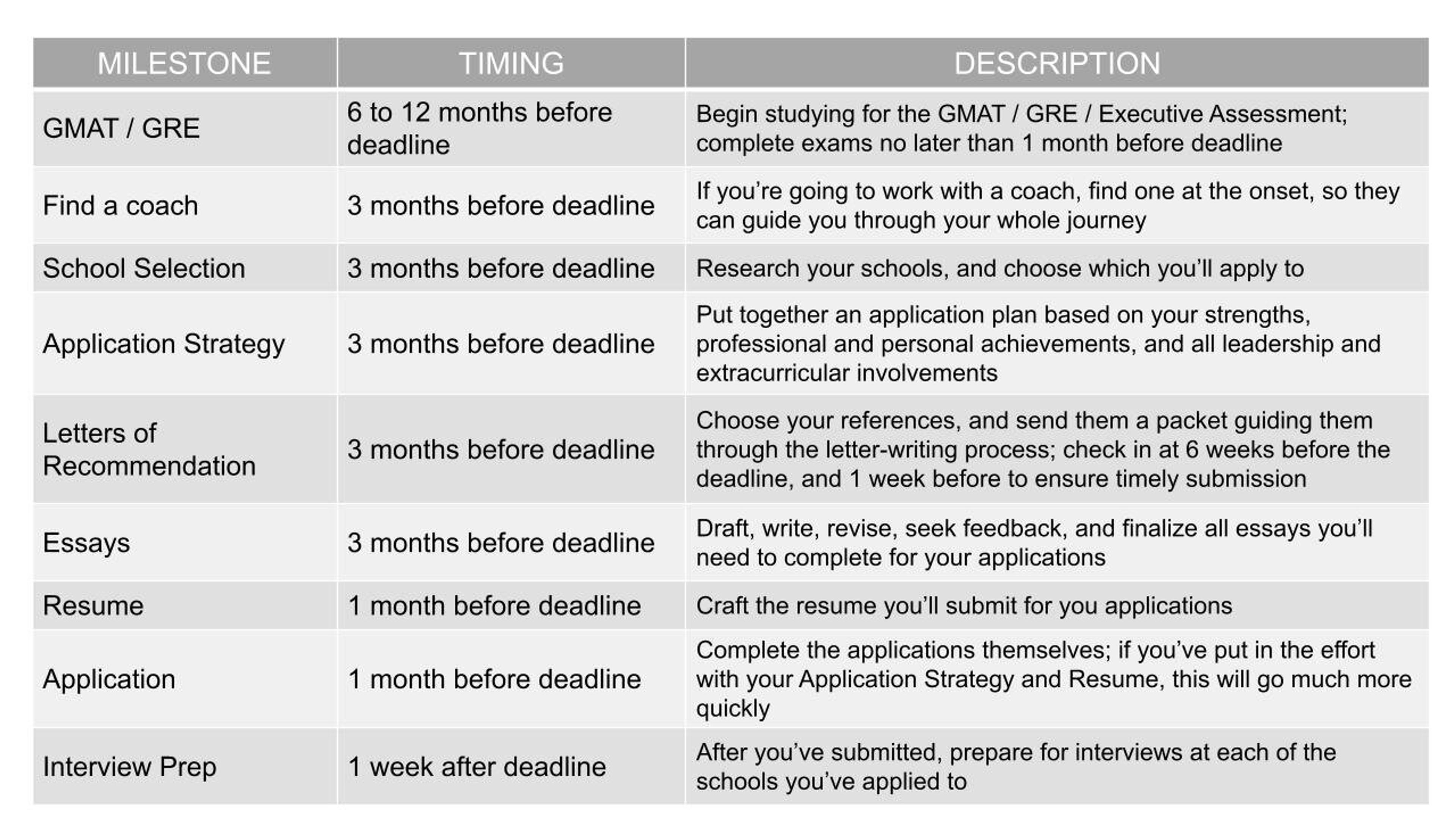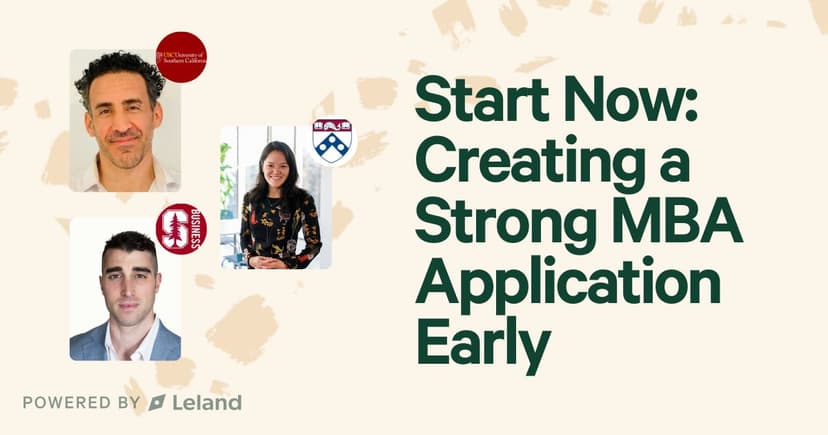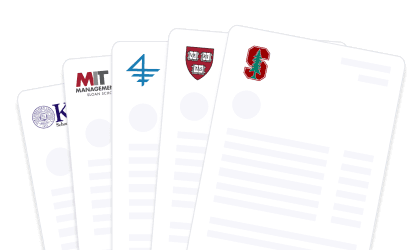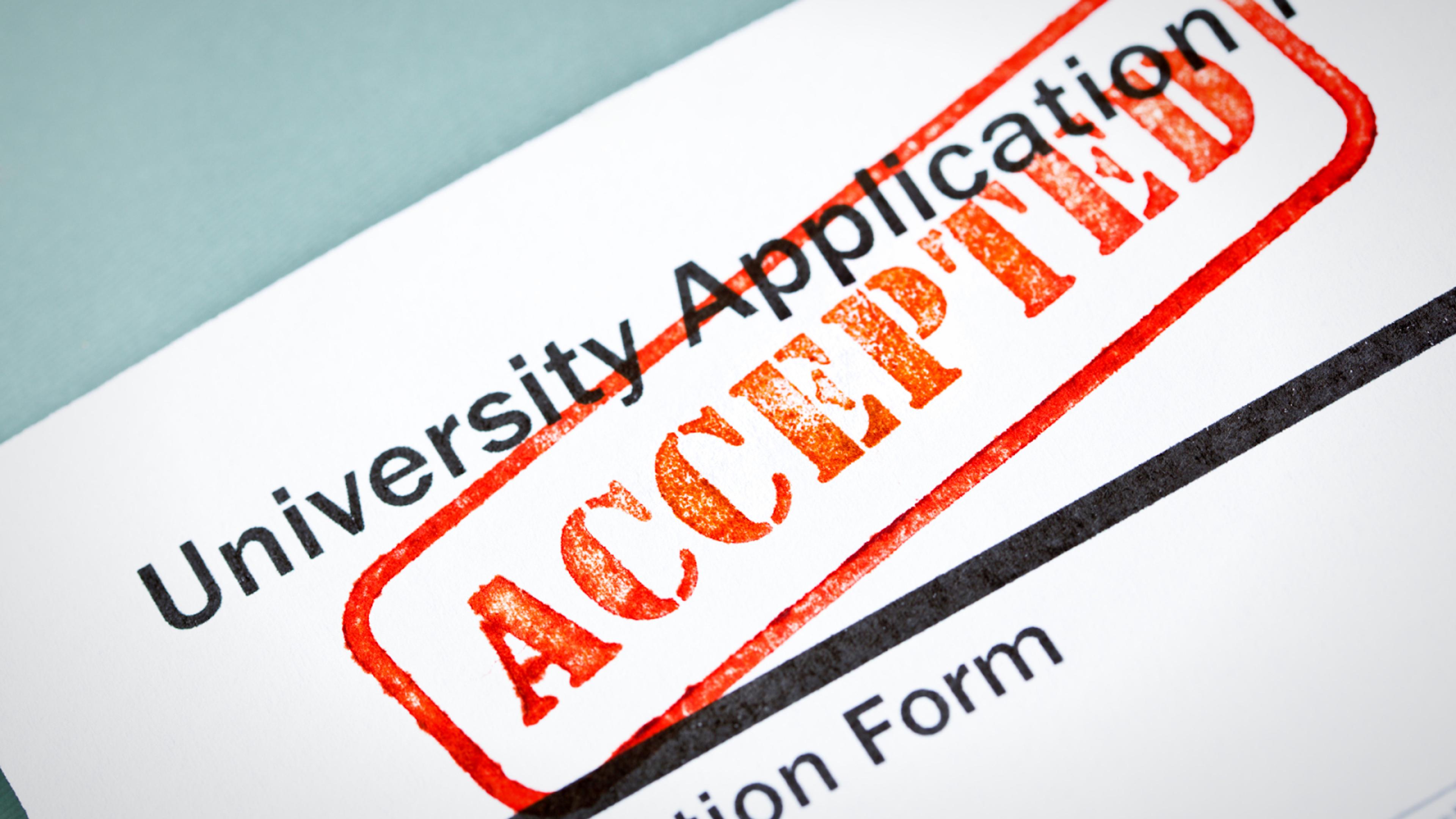
Join a free event
Learn from top coaches and industry experts in live, interactive sessions you can join for free.
Table of Contents
Applying to business school takes planning, focus, and a clear strategy. Whether you’re a college senior looking at deferred MBA programs or a working professional aiming for the next admissions cycle, knowing what to do and when is key. This guide lays out a month-by-month MBA timeline, which serves as a detailed timeline for when to apply. It includes everything you’ll need for your application: test scores, essays, resume, recommendation letters, and interviews. The timeline is based on advice from top experts, including Melissa Prevost, senior MBA admissions counselor at Stratus Admissions, and Caryn Altman, senior MBA admissions consultant at Stacy Blackman Consulting. It also includes practical insights for international students and reapplicants.
To prepare for the standardized tests like the GRE or GMAT, start studying well in advance of application deadlines. Additionally, proactive financial planning is crucial, and considering options like personal savings and employer sponsorship can help manage the high costs associated with an MBA program.
When Do MBA Applications Open and Close?
Most MBA programs follow a three-round application process. Understanding these rounds and when to apply to B-School is key to making the best impression with your application. Here’s how it breaks down:
It is crucial to prepare for standardized tests like the GRE or GMAT well in advance, especially if you aim to meet the round one admission deadlines. Most MBA programs have multiple application rounds, and having test scores ready by March is ideal for those aiming for the first round of admissions in the fall.
| Round | Typical Deadline | Recommended For |
|---|---|---|
| Round 1 | September or October | Strong candidates with early prep |
| Round 2 | January | Candidates who need more time |
| Round 3 | March or April | Less recommended, except for special cases |
Round 1 – September or October
Round 1 is the most competitive and often has the best odds for acceptance, with the first deadline typically occurring in the September or October round. It’s ideal for applicants who have already done their homework, including GMAT/GRE prep, school research, essay drafting, and identifying safety schools in round 1. Additionally, applying in this round can increase your chances of receiving scholarships and financial aid, as schools tend to allocate a larger portion of funding in Round 1. If you’re applying from an overrepresented background (e.g., finance or consulting), this round is your best chance to stand out.
To maximize your chances for acceptance and potential scholarships, consider applying to a mix of stretch, target, and safety schools in round one.
Round 2 – January
Round 2 is the most popular round, and it still offers strong chances of admission, especially if you’ve taken the time to refine your application. Many applicants who missed the Round 1 deadline or need extra time to improve their test scores, essays, or recommendation letters tend to apply during Round 2. While it’s a bit more competitive due to the higher volume of applications, applicants should begin studying early to prepare effectively, and it still provides a fair shot at top schools. However, keep in mind that scholarship opportunities may be more limited in this round.
Round 3 – March or April
Round 3 is considered the “last chance” for most applicants. By this time, many schools have filled a substantial portion of their class, and the remaining spots tend to be highly competitive. Applying in Round 3 is generally not recommended unless you have a unique background that can make your application stand out (e.g., international students or applicants with extraordinary achievements). Additionally, Round 3 applicants often have fewer opportunities for scholarships and financial aid.
Insights on Application Timing:
- Round 1: The best shot for competitive applicants, especially those seeking funding. If you’re well-prepared and have your application materials in order, this is your chance to secure an early spot and financial aid.
- Round 2: Offers a strong chance for most applicants, but you’ll face more competition and fewer scholarship opportunities. This round is ideal if you need extra time to perfect your application.
- Round 3: More competitive and generally harder to get into, especially without a standout profile. Consider applying only if you’re confident your application is exceptional or if you’re targeting safety schools.
Note: The application windows for each round are fixed, but when you begin your preparation depends on your personal situation and profile. This is where the month-by-month plan becomes crucial for keeping you on track, especially in the year before mba application.
MBA Application Timeline – Month-by-Month Breakdown
This breakdown provides a clear, month-by-month plan leading up to your MBA application deadline ahead of program deadlines. It’s based on Round 1 timelines but can easily be adjusted for Rounds 2 or 3. By following this plan, you’ll be prepared to submit your strongest application, without the stress of last-minute scrambling. Consider starting your preparation for standardized tests in the fall or winter before MBA program deadlines. This early start allows for a strategic approach to improve test scores and enhance your overall application readiness.
12+ Months Before Your Application Deadline
The first step in your MBA journey is reflecting on whether business school is the right next step for your career. Take the time to define your goals and how an MBA aligns with them.
- Set Career Goals: Clearly define where you want your career to go and how an MBA will help you get there. Think about what skills you want to develop and which industries you want to break into.
- Research MBA Programs: Dive deep into researching MBA programs. Build a list of target schools based on factors like location, curriculum, faculty, job placement rates, and alumni networks. Remember, this is a long-term decision, so focus on finding the programs that truly fit your goals.
- Plan Your Finances: An MBA can exceed $200,000 at top schools. Begin exploring funding options early, such as personal savings, employer sponsorship, scholarships, grants, and federal and private loans. These options can include personal savings and employer sponsorship, among others. It’s never too early to think about how to finance your education.
- Attend Info Sessions and Talk to Alumni: Get a feel for the schools on your list by attending online or in-person info sessions. Networking with alumni and current students will give you valuable insights into the programs you’re interested in. This is also a great way to start building connections.
9 to 12 Months Before Deadline
Now that you’ve decided to pursue an MBA, it’s time to start preparing for the big steps ahead, particularly six months before MBA deadlines.
- Start Studying for the GRE/GMAT: This is one of the most important parts of your application. Start preparing for the GRE or GMAT during the fall or winter before your application deadline. The earlier you start, the more confident you’ll be. Be mindful of program deadlines, says Melissa. Starting early can significantly enhance your chances of success in your MBA applications.
- Consider Working with a Test Prep Tutor: If you’re aiming for a competitive score, consider hiring a tutor. As Melisa Prevost, Senior MBA Admissions Counselor, suggests, “Give yourself ample time for prep, including time for a retake if needed.”
- Outline Your Application Strategy: Think about your application as a whole. This isn’t just about getting the scores; it’s about positioning your story. Caryn Altman, Senior MBA Consultant, advises applicants to start crafting their story early, so they can highlight their unique strengths and experiences throughout their application.
6 to 9 Months Before Deadline
This is the phase where the heavy lifting begins. You’ll finalize your testing and start shaping your application.
- Take Your Test: By this point, you should have your GRE or GMAT scores locked in. Take the test with enough time for a retake, if needed.
- Visit Campuses and Network: Plan campus visits to get a feel for the environment and culture of each school. Attend school-hosted events and network with current students and alumni to get insider insights on what it’s really like to attend.
- MBA Programs Release Interviews: Be aware that MBA programs release interviews in different ways. Some schools provide interview invites on a specific date, while others utilize a rolling interview schedule. Prepare for interviews soon after submitting applications, as the timing and format can vary.
- Build Your MBA Resume: Start compiling your MBA resume with a focus on leadership experience, professional achievements, and extracurricular activities. An MBA resume differs from a typical job resume, so tailor it to highlight your potential as a future business leader.
- Refine Your List of Target Schools: After conducting deeper research, continue to refine your list. Narrow down your choices based on fit, including culture and post-graduation opportunities.
3 to 6 Months Before Deadline
As your application deadline approaches, it’s time to focus on finalizing your application materials.
- Begin Writing Essays: Start drafting your MBA application essays three months before MBA application deadlines. These essays will form the core of your application, so take your time to reflect on your goals, achievements, and why you’re applying to business school.
- Request Letters of Recommendation: You’ll need to request recommendation letters from mentors or supervisors. Make sure to give them enough time to write strong, thoughtful letters. It’s a good idea to formally ask for recommendations at least three months ahead of the deadline.
- Complete the Application Form: Ensure you complete the application form thoroughly. This often requires detailed biographical and demographic information, along with short-answer questions. Treat the form with intentionality, similar to other aspects of the application process.
- Set Up a Call with a Coach: Work with a coach to finalize your application process plan. Whether you need help with your essays, interview prep, or school selection, a coach can help guide you through each step and provide feedback on your materials.
- Refine Your Application Strategy: This is when you should solidify how each school aligns with your career goals. Be sure you can clearly explain why each program fits your aspirations and how you plan to contribute to the school’s community.
- Prepare for Interviews: Start thinking about interview formats and common questions. While interviews are typically scheduled after submission, it’s helpful to prepare ahead of time.
1 to 3 Months Before Deadline
Now is the time for final revisions and submission prep.
- Finalize Essays, Resume, and Recommendation Letters: This is the final stretch. Spend the last month refining your essays, resume, and recommendation letters. Make sure everything aligns and clearly supports your case for admission.
- Complete the Application Forms: Carefully fill out the online application forms. Be sure to address all short-answer questions in addition to your essays. Double-check your work to ensure accuracy.
- Review Your Test Scores: Check your test scores and decide if a retake is needed. Some applicants find it helpful to retake the test to boost their score.
- Submit Early: If you can, submit your applications early. This gives you a buffer in case you find any issues with your submission or if you need to address any last-minute details.
Manage Waitlist Status: Actively manage your waitlist status if you are waitlisted. Keep schools informed about your progress and accomplishments, and follow the specific protocols set by the schools for communication.

For a list of all the application deadlines for the top business schools, read this: MBA Application Deadlines of the Top 25 Business Schools.

MBA Application Checklist
Download our free checklist for the MBA application used by thousands of applicants to build the strongest application possible without running up against any deadlines
When Should You Start? It Depends on Your Profile
Deferred MBA Applicants
If you’re still in college, your application will primarily reflect your academic achievements and potential for growth. Since you won’t have full-time work experience yet, it’s important to focus on building strong internships and leadership roles. Engage in extracurricular activities that allow you to demonstrate leadership, initiative, and the ability to manage projects. Start early by planning for these experiences, as they will form the core of your application. Be prepared to show how these experiences will translate into your future goals post-MBA.
Traditional Applicants (3–7 Years of Experience)
If you have a few years of full-time work experience, your application will likely focus more on your professional growth and leadership potential. This is your time to shine by highlighting promotions, complex projects, and any leadership roles you’ve taken on in your career. The timeline for test prep and school research should be tailored to your professional commitments. Consider when you can fit in focused prep time, and align it with your work schedule to ensure you’re not overwhelmed. Your story will be centered around your career trajectory, so make sure to outline the achievements that demonstrate your growth and readiness for business school.
International Students
For international students, it’s crucial to apply in Round 1 or 2. These rounds allow enough time for visa processing and ensure you don’t face delays that could impact your ability to start the program. Many schools advise applying early to give yourself the best chance for a smooth transition, aligning with the application deadline, Prevost suggests. Beyond the application itself, consider the additional paperwork required for visas and financial aid, and plan accordingly. Be sure to keep track of specific MBA program deadlines and any unique requirements for international applicants.
Reapplicants
If you’re applying again after a previous attempt, this is your opportunity to refine your strategy. Review any feedback you received and use it to address gaps or weaknesses from your last application. Whether it’s improving your test scores, strengthening your essays, or showcasing new career achievements, take the time to reframe your story for Round 2. Don’t rush into another application without first evaluating what could be improved. Consider consulting with an admissions coach to help you navigate this process and improve your chances in the next round.
What to Do (and When) to Stay on Track
Start Strategy Work Early
The foundation of your application is your personal story and career goals. Begin strategy work early, ideally 9–12 months before your application deadline. Reflect on your experiences and articulate your aspirations, both short-term and long-term. Experts encourage applicants to begin this early groundwork to clarify their long-term and short-term goals, ultimately making the application process more efficient. Your story will become the backbone of your essays and interviews, so it’s essential to have clarity on your goals. Think about what you want to achieve with an MBA and why a specific school is the right fit for you. This clarity will help you craft authentic essays that stand out.
Take the GRE, GMAT, or EA
Test prep is a key part of the process, says Melisa Prevost, senior. Start studying 9 to 6 months before your application deadline, depending on when your test date is. The sooner you begin, the more time you’ll have to improve your score. Many test takers must wait 16–21 days between retakes, so plan your schedule accordingly. If you’re aiming for a competitive score, consider taking a prep course or hiring a tutor for focused guidance. You’ll want to ensure you’re not rushed, so give yourself ample time to master the material.
Starting the MBA application process early, says Caryn Altman, can alleviate the daunting nature of the application, which involves multiple components and strict deadlines.
For more advice and guidance regarding the GMAT and GRE, read our article GMAT vs. GRE for Business School—Which Should You Take (and How to Ace Both).
Build Your School List
It’s tempting to rely solely on rankings, but match business schools to your personal and professional goals. Research MBA program deadlines, faculty, student groups, extracurricular opportunities, and the location that fits your lifestyle. It’s important to find a school that aligns with both your career goals and personal values. Don’t forget to consider factors like work-life balance and the school’s culture. Start building your list of target schools early, and refine it as you learn more. Make sure each school you apply to is a place where you can see yourself thriving.
Write Your Essays
Start writing at least three months before your application deadline. Essay prompts often remain the same, so this will give you ample time to brainstorm, draft, and revise. Understanding and preparing for different essay questions is crucial, as they vary by school. Avoid generic answers and instead focus on using your authentic voice. Admissions committees want to hear your story, not a cookie-cutter response. Each essay should be tailored to the school, demonstrating your genuine interest and explaining why that school is a perfect fit for your goals. Don’t rush through the writing process; take the time to reflect on your experiences and aspirations. Remember, your essays are one of the best ways to show your personality and distinguish yourself from other applicants.
The essays are the toughest nut to crack. If you need a practiced guide to help you, you'll find dozens of MBA essay experts on Leland.
To learn more, read these articles:
- How to Write a Powerful MBA Essay
- A Guide to the Booth Essays
- A Guide to the HBS Essay
- A Guide to the Wharton MBA Essays
- The Ultimate M7 MBA Essay Guide
Request Letters of Recommendation
Ask for recommendation letters three months before your application deadline. Choosing the right recommenders is essential. Look for individuals who know you well and can speak to your strengths, achievements, and potential for success in an MBA program. After selecting your recommenders, send them a prep packet that includes your resume, a bullet-point list of key contributions, and specific points you’d like them to address. This will help ensure that your letters are targeted and reflective of your best qualities.
Click here to read more about How to Get the Perfect MBA Recommendation Letter.

MBA Recommender Prep Doc
Download our free recommender prep doc used by thousands of applicants to get the strongest possible letters of rec
Draft and Edit Your Resume
Your MBA resume isn’t your typical job application resume. This document should coordinate several components standardized to highlight your leadership experiences, team impact, and quantifiable results. Limit your resume to one page, ensuring it’s clear, concise, and tailored for the admissions committee. Focus on accomplishments that demonstrate your potential for growth and leadership. Don’t just list your responsibilities, show how you’ve made an impact. Think about the skills and experiences you’ve gained that will make you an asset to the MBA classroom and beyond.
Prepare for Interviews
Begin preparing for interviews one week after submitting your application or once you receive an interview invitation. MBA programs release interview invites in different ways; some schools provide interview invites on a specific date, while others utilize a rolling interview schedule. Interviews are your chance to make a personal connection with the admissions team and show them who you are beyond your application materials. Practice your responses to common questions, like “Why MBA?” and “Why this school?”, and work on delivering your answers clearly and confidently. Know the format: Some schools conduct blind interviews, while others are panel-based or behavioral. If you’re invited for interviews, treat it as a new opportunity to showcase your strengths and reaffirm why you’re a great fit for the program.
Common Pitfalls and Timing Mistakes to Avoid
Waiting Too Long to Test
One of the biggest mistakes applicants make is delaying their GRE or GMAT test prep. Early, says Caryn Altman, a senior MBA admissions consultant, starting the MBA application process can alleviate the daunting nature of the application, which involves multiple components and strict deadlines. You might not have time for a retake, which could impact your chances if you don’t get the score you want the first time. Test prep takes time, and it’s important to factor in possible retakes if your first score doesn’t meet your target. Start studying well in advance, nine to six months before deadlines, to avoid being rushed and to give yourself the best shot at a competitive score.
Late Recommendation Letters
Recommendation letters are crucial, and waiting too long to request them can cause unnecessary stress. Recommenders are busy, and they may not have the time to craft thoughtful letters unless you give them plenty of notice. Aim to ask for your letters at least three months before the application deadline. That way, your recommenders can write their best letters without feeling rushed, and you’ll have time to follow up if needed.
Rushing Essays
Your essays are your chance to stand out, but rushing through them rarely leads to a strong application. Admissions committees can tell when an essay feels rushed or lacks depth. Take the time to brainstorm, write drafts, and revise. Start early so you don’t feel pressured and can polish your essays to reflect your true voice and story. Give each essay the attention it deserves; it’s one of the most important parts of your application.
Ignoring School Fit
It’s easy to get caught up in rankings, but choosing schools based solely on rank can backfire. The best MBA program for you is one that aligns with your career goals, values, and preferred learning environment. Take the time to research each school carefully, consider factors like culture, faculty, location, and the type of career paths alumni pursue. A school that’s ranked highly might not always be the best fit for you, so look beyond the rankings and choose a program where you’ll thrive both academically and personally.
Post-Submission Timeline
Once you hit “submit,” start preparing for interviews. Schools may invite you a few weeks later. Interviews can be rolling or released all at once. If you don’t get interview invites by mid-November (for R1), think about adjusting for R2. Some applicants refine essays or retake tests between rounds.
It is also crucial to manage waitlist status actively. If you’re waitlisted, keep engaging. Send updates on promotions, test scores, or projects. Follow the school’s instructions for contact.
The Bottom Line
The MBA application process is demanding, but with careful planning and a clear timeline, you can approach it confidently. Starting early, says Caryn Altman, ideally 9 to 12 months before your application deadline, gives you ample time to prepare your test scores, craft your essays, request strong recommendation letters, and refine your resume. Whether you’re applying in Round 1, 2, or 3, the key is to choose the round that aligns best with your preparation and profile. Applying early not only improves your chances of acceptance but also increases your eligibility for scholarships and financial aid. Stay organized, avoid rushing, and seek expert guidance if needed. With the right strategy, you’ll be well on your way to submitting a competitive and polished MBA application.
Work With a Coach to Build a Custom MBA Timeline
The MBA application is made up of several components: standardized testing, essays, resume, recommendation letters, and interviews. Early, says Caryn Altman, a senior MBA admissions consultant, starting the process can alleviate the daunting nature of managing all of them while working full time. Coaches can help you plan each step and avoid mistakes. Working with an expert who understands MBA program deadlines gives you accountability, feedback, and confidence, especially when deadlines are close. Browse the MBA admission coaches here.
For more help throughout the MBA application process, check out the following articles:
- The Different Types of MBA Programs—and Which One is Right for You
- How to Craft the Ultimate MBA Resume—With Examples
- How to Get the Perfect MBA Letter of Recommendation—With Examples
- How to Write a Powerful MBA Essay—With Examples
- What is an MBA Degree? An Expert Guide
- MBA Requirements: What You Need to Apply (and What Top Programs Really Look For)
MBA Application FAQs
When should I start my MBA application?
- It’s best to start your MBA application process 9 to 12 months before your first application deadline. Starting early, says Caryn Altman, a senior MBA admissions consultant, can alleviate the daunting nature of the application, which involves multiple components and strict deadlines. This gives you ample time to prepare for standardized tests, research schools, refine your resume, and draft your essays. Starting early will help you manage the process without rushing and ensure you can submit a well-rounded, thoughtful application.
At what age should I apply for an MBA?
- While there’s no specific age to apply for an MBA, most applicants are between 25 and 32 years old. However, this can vary depending on the individual’s work experience. Some applicants apply with as little as 2–3 years of experience, while others wait until they have 5–7 years of professional experience. It’s not about age but about when you feel ready to leverage an MBA to accelerate your career.
When should I pursue an MBA?
- The right time to pursue an MBA depends on your career goals and personal situation. Most people pursue an MBA when they have enough professional experience, typically around 3 to 7 years, to benefit from the program and contribute meaningfully to classroom discussions. It’s also a good idea to consider when the skills and network you’ll gain from an MBA will have the most impact on your career trajectory.
Which round is best to apply for an MBA?
- The best round to apply for an MBA is typically Round 1, especially if you are well-prepared and have your application materials ready. Round 1 tends to have the highest chances of acceptance and scholarship opportunities. Round 2 is still a strong option, but it’s more competitive since many spots are already filled. Round 3 is generally not recommended unless you have a standout profile, as fewer spots remain and the competition is tougher.
Browse hundreds of expert coaches
Leland coaches have helped thousands of people achieve their goals. A dedicated mentor can make all the difference.



























